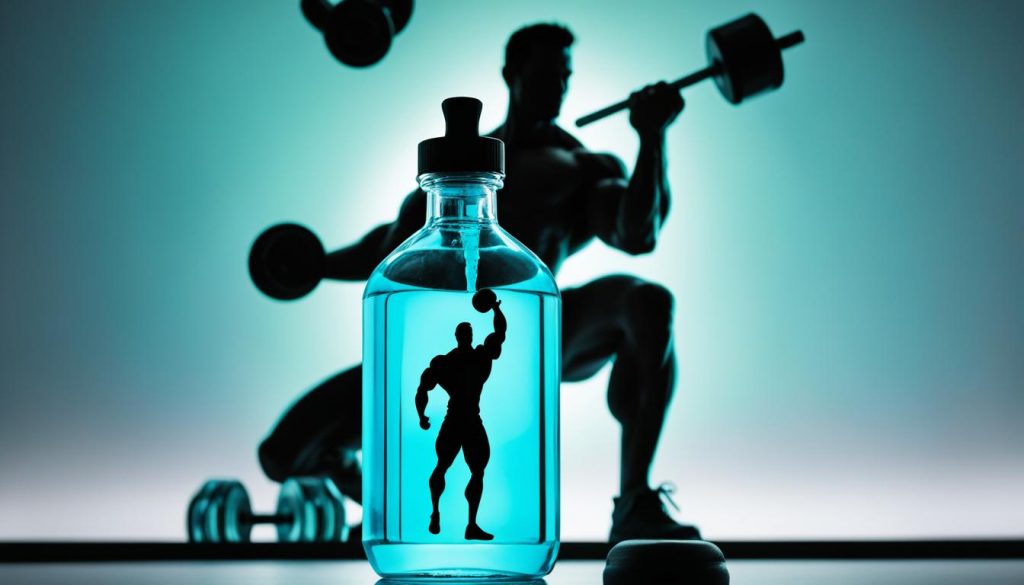Soccer is a dynamic sport that demands heightened endurance, with players running beyond seven miles in a single match. Soccer players can employ dietary supplements to boost their performance and maximize potential. Such supplements can augment stamina, energy, muscle recuperation, and holistic athletic prowess.
Key Takeaways:
- Supplements can enhance endurance, energy levels, muscle recovery, and overall athletic performance for soccer players.
- Beta-alanine helps improve endurance by buffering lactic acid production in muscles.
- Creatine enhances strength, muscle mass, and anaerobic running capacity.
- L-Carnitine aids in fat utilization during physical activity, improving power and endurance.
- Caffeine supplements can provide an energy boost, improve reaction time, and enhance focus and concentration.
Beta-Alanine for Endurance Boost
Soccer players require exceptional endurance to perform at their best on the field. To achieve peak performance and maintain high energy levels, many soccer players turn to beta-alanine, a popular ingredient found in pre-workout supplements.
Beta-alanine works by buffering the production of lactic acid in the muscles. Lactic acid is a byproduct of intense exercise that can lead to muscle fatigue and a decrease in performance. By reducing lactic acid accumulation, beta-alanine helps soccer players prolong their endurance and push through physical challenges for longer periods.
When taken regularly and as part of a balanced training and nutrition regimen, beta-alanine can have a significant impact on an athlete’s performance on the field. Soccer players who supplement with beta-alanine may experience improved stamina, reduced muscle fatigue, and an extended capacity to sustain their energy levels during intense matches.
“Beta-alanine has been shown to enhance endurance, enabling soccer players to go the extra mile and maintain their performance throughout the game,” says Dr. Maria Sanchez, a sports nutritionist.
The Science Behind Beta-Alanine
Beta-alanine is an amino acid that combines with histidine in the body to form carnosine – a compound found in high concentrations in muscle tissues. Carnosine acts as a buffer, helping to regulate the pH levels in muscles during high-intensity exercise. By increasing carnosine levels with beta-alanine supplementation, soccer players can delay the onset of muscle fatigue and improve their overall endurance.
“Carnosine acts as a pH regulator in the muscles, allowing soccer players to sustain their effort without experiencing excessive muscle burn or fatigue,” explains Dr. Sanchez.
Taking Beta-Alanine Supplements
Beta-alanine supplements are available in capsule or powder form and can be taken before training sessions or matches. The typical dosage ranges from 2 to 5 grams per day, divided into smaller servings to minimize the potential side effect known as “paresthesia” – a harmless tingling sensation on the skin.
“Beta-alanine has become a staple supplement for many professional soccer players due to its proven benefits in enhancing endurance. It’s crucial to follow the recommended dosage and consult with a healthcare professional or sports nutritionist to ensure proper usage and minimize any potential side effects,” advises Dr. Sanchez.
Soccer players who are interested in incorporating beta-alanine into their supplement routine should consult with a healthcare professional or sports nutritionist to determine the appropriate dosage and ensure it aligns with their specific nutritional needs and goals.
Creatine for Strength and Anaerobic Capacity
Creatine is a powerhouse among soccer performance supplements. It has been extensively studied and proven to be effective in enhancing athletic performance. Soccer players can greatly benefit from incorporating creatine into their training regimen to improve their strength and anaerobic capacity, giving them a competitive edge on the field.
Creatine works by replenishing the body’s ATP (adenosine triphosphate) stores, which are the primary source of energy during high-intensity, short-duration activities like sprinting and explosive movements. By increasing the available ATP, creatine can help soccer players perform at maximum intensity for longer periods and recover more quickly between bursts of intense activity.
In addition to boosting energy levels, creatine supplementation has been shown to enhance strength and muscle mass. This can have a significant impact on a soccer player’s ability to win physical battles on the field, such as challenging for the ball or shielding it from opponents. The increased muscle mass and strength gained from creatine supplementation can also aid in injury prevention.
One of the key benefits of creatine is its positive impact on anaerobic running capacity. Anaerobic running, characterized by short bursts of high-intensity activity without sufficient oxygen supply, is a crucial aspect of soccer performance. By improving anaerobic capacity, creatine enables players to maintain their speed, power, and explosiveness during intense game situations, such as sprinting to beat an opponent to the ball or executing quick changes in direction.
When supplementing with creatine, it’s important to follow recommended dosages and consult with a healthcare professional or sports nutritionist to ensure optimal results and safety. It’s also essential to combine creatine supplementation with a balanced diet and training program tailored to soccer-specific needs.
By harnessing the power of creatine, soccer players can enhance their strength, increase anaerobic capacity, and improve overall performance on the field. Consider incorporating creatine into your soccer performance supplements regimen to elevate your game and excel in every match.
L-Carnitine for Fat Utilization
In the world of soccer, where endurance and power are key, optimizing fat utilization can make a significant difference in a player’s performance. L-Carnitine, a natural substance found in the body, plays a crucial role in the transportation of fatty acids into the mitochondria, the energy-producing powerhouses of cells. By facilitating the utilization of fat as a fuel source, L-Carnitine helps soccer players tap into their fat stores to sustain energy levels during intense physical activity.
L-Carnitine supplementation has been shown to improve both anaerobic power and endurance in athletes. In the case of soccer players, who often engage in matches lasting 90 minutes or longer, L-Carnitine can be particularly beneficial when carbohydrate stores become depleted. By utilizing fat as an energy source, players can conserve valuable glycogen reserves, delaying fatigue and maintaining optimal performance on the field.
The Science behind L-Carnitine and Fat Utilization
L-Carnitine works by transporting long-chain fatty acids into the mitochondria, where they undergo beta-oxidation, a process that breaks down fat molecules to generate ATP, the cellular energy currency. This process is crucial during prolonged physical activity, as the body transitions from predominantly utilizing carbohydrates to tapping into fat stores for fuel.
L-Carnitine helps soccer players unlock the potential of their fat reserves, allowing them to prolong their endurance and preserve their energy levels during demanding matches.
Studies have shown that L-Carnitine supplementation can lead to increased fat oxidation, improved endurance, and reduced markers of muscle damage in athletes. For soccer players, these benefits translate to enhanced performance on the field, enabling them to sustain the high-intensity movements, quick bursts of speed, and repeated sprint efforts required to outshine their opponents.
The Role of L-Carnitine in Soccer Performance Supplements
As one of the key ingredients in soccer performance supplements, L-Carnitine offers a natural and safe way to optimize fat utilization. By incorporating L-Carnitine into their training and nutrition regimen, soccer players can tap into their fat stores more effectively, enhance endurance, and improve overall performance on the field.
It’s important to note that the effectiveness of L-Carnitine supplementation may vary depending on individual factors, such as diet, training intensity, and overall fitness level. Consultation with a healthcare professional or sports nutritionist can help determine the appropriate dosage and timing of L-Carnitine supplementation for optimal results.
Benefits of L-Carnitine for Soccer Players
| Benefits | Description |
|---|---|
| Enhanced Fat Utilization | Facilitates the utilization of fat as a fuel source, preserving glycogen stores during matches. |
| Improved Endurance | Helps soccer players maintain performance and delay fatigue during prolonged physical activity. |
| Optimized Energy Levels | By tapping into fat stores, L-Carnitine supports sustained energy levels during intense soccer matches. |
When it comes to optimizing fat utilization and elevating soccer performance, L-Carnitine proves to be a valuable addition to a soccer player’s supplement arsenal. By harnessing the power of fat as a fuel source, players can unlock their true potential on the field, gaining an edge over their competitors.

Caffeine for Energy and Focus
Caffeine is a popular and widely consumed stimulant known for its energy-boosting properties. It can provide a quick and effective way to enhance both aerobic and anaerobic performance, making it a valuable supplement for soccer players looking to optimize their on-field capabilities.
When consumed in moderate amounts, caffeine has been shown to:
- Increase energy levels
- Improve reaction time
- Boost focus and concentration
For soccer players, the ability to maintain high energy levels throughout a game is essential. Caffeine can help by stimulating the central nervous system, increasing alertness, and delaying the onset of fatigue. This can result in improved performance and a competitive edge on the field.
A study published in the International Journal of Sport Nutrition and Exercise Metabolism found that caffeine supplementation before exercise increased endurance capacity and time to exhaustion. This indicates that caffeine can be particularly beneficial for soccer players seeking to enhance their stamina and overall performance.
Incorporating caffeine supplements into your soccer performance routine can provide the energy boost and mental focus needed to excel on the field.
It’s important to note that while caffeine can offer various performance-enhancing benefits, it should be used strategically and in moderation. The optimal dosage and timing may vary depending on individual tolerances and preferences. Consulting with a sports nutritionist or healthcare professional can help determine the most suitable caffeine intake for your specific needs.
The Role of Caffeine in Soccer Performance
Caffeine acts as a powerful ergogenic aid, meaning it can enhance physical performance. Its effects on the body include:
- Stimulating the central nervous system, increasing alertness and reducing perceived exertion during physical activity.
- Promoting the release of dopamine, a neurotransmitter associated with motivation and focus, improving mental performance and concentration.
- Increasing fat oxidation, potentially sparing glycogen stores and extending endurance capacity.
By targeting both the mind and body, caffeine supplements can provide soccer players with the necessary energy boost and cognitive edge to perform at their best. Incorporating caffeine into your pre-workout or pre-game routine may help you achieve optimal results on the field.
However, it’s essential to note that individual responses to caffeine can vary. Some people may be more sensitive to its effects, while others may have higher tolerances. It’s recommended to start with a lower dose and gradually increase as needed, while monitoring how it affects your performance and sleep quality.
| Benefits of Caffeine for Soccer Players | Considerations |
|---|---|
| Improved energy levels | Individual caffeine sensitivity |
| Enhanced focus and concentration | Timing of consumption |
| Increased endurance and stamina | Monitoring sleep quality |
Remember, caffeine is not a substitute for proper nutrition, hydration, and rest. It should be used as part of a comprehensive approach to soccer performance that includes a balanced diet, adequate hydration, and sufficient sleep for optimal results.
Whey Protein for Muscle Recovery
When it comes to soccer performance supplements, whey protein is a game-changer for muscle recovery. Protein plays a crucial role in repairing and rebuilding muscles after intense training sessions or games. And whey protein, derived from milk, stands out as a complete protein source that contains all the essential amino acids necessary for muscle repair.
Including whey protein supplements in a soccer player’s nutrition regimen can promote faster muscle recovery and growth. By providing the body with the building blocks it needs, whey protein supports the repair of damaged muscle fibers and helps athletes bounce back quicker for the next match.
Aside from aiding muscle recovery, whey protein offers other benefits for soccer players. It can also enhance muscle strength, support optimal immune function, and improve overall body composition. With its rapid absorption rate, whey protein delivers essential nutrients to the muscles quickly, helping athletes maximize their performance on the field.
To reap the benefits of whey protein for muscle recovery, soccer players can consume it as a post-workout shake or incorporate it into their meals as an ingredient. It’s important to choose a high-quality whey protein supplement from a reputable brand to ensure optimal results.
Key Benefits of Whey Protein for Soccer Players:
- Promotes faster muscle recovery and repair
- Enhances muscle strength and development
- Supports optimal immune function
- Improves overall body composition
“Whey protein has been a game-changer for my recovery. After incorporating it into my regimen, I’ve noticed a significant decrease in muscle soreness and faster bounce-back after intense matches.” – Alex Morgan, Professional Soccer Player
Multivitamins for Overall Health
A well-rounded multivitamin can play a vital role in supporting the overall health and well-being of soccer players. Alongside a nutritious diet, multivitamins provide essential vitamins and minerals that ensure athletes are meeting their nutritional needs.
One key benefit of multivitamins for soccer players is their ability to reduce oxidative stress and inflammation caused by physical exertion. Vitamins C and E, both commonly found in multivitamin formulations, are powerful antioxidants that help combat the free radicals produced during intense exercise.
Oxidative stress and inflammation can impair muscle recovery and hinder performance in soccer players.
By including multivitamins in their supplement regimen, soccer players can support their immune function, reduce the risk of illness, and aid in the repair and regeneration of damaged muscle tissue.
To ensure optimal effectiveness, it’s important for soccer players to choose high-quality multivitamin supplements that provide a comprehensive blend of essential vitamins and minerals. Consulting with a healthcare professional or sports nutritionist can help determine the most suitable multivitamin for individual needs and goals.
The Benefits of Multivitamins for Soccer Players:
- Support overall health and well-being
- Reduce oxidative stress and inflammation
- Enhance immune function
- Aid in muscle recovery and repair
- Promote optimal performance on the field

Omega-3 Fish Oil for Inflammation Reduction
Omega-3 fish oil supplements, rich in DHA and EPA fatty acids, have been shown to be beneficial in reducing inflammation and improving cardiovascular health. These supplements can be particularly advantageous for soccer players who partake in high-intensity physical activity. Supplementing with omega-3 fish oil can aid in the reduction of pain caused by physical exertion and support overall health.
Fish oil, derived from fatty fish such as salmon, mackerel, and sardines, is a natural source of omega-3 fatty acids. The two main types of omega-3 fatty acids found in fish oil – docosahexaenoic acid (DHA) and eicosapentaenoic acid (EPA) – have demonstrated anti-inflammatory properties, making them valuable for athletes and individuals with conditions related to inflammation.
The consumption of omega-3 fish oil has been associated with decreased levels of pro-inflammatory markers in the body, such as C-reactive protein (CRP) and interleukin-6 (IL-6). These markers are important indicators of inflammation and can contribute to pain and discomfort in soccer players.
In addition to reducing inflammation, omega-3 fish oil has been found to promote heart health by lowering triglyceride levels, improving blood flow, and reducing the risk of cardiovascular diseases. This can be especially beneficial for soccer players, as cardiovascular fitness plays a crucial role in supporting endurance and overall performance on the field.
To incorporate omega-3 fish oil into your supplement regimen, it is important to choose a high-quality product from a reputable brand. Look for supplements that are third-party tested for purity and potency.
Benefits of Omega-3 Fish Oil for Soccer Players:
- Reduces inflammation and pain caused by physical exertion
- Supports cardiovascular health and enhances blood flow
- Promotes joint health and flexibility
- Enhances cognitive function and brain health
- Aids in muscle recovery and repair
Integrating omega-3 fish oil into your supplement routine may provide valuable benefits for soccer players. However, it’s important to consult with a healthcare professional or sports nutritionist before starting any new supplement to ensure it is appropriate for your individual needs and goals.
The Importance of Carbohydrates
Carbohydrates are the primary fuel source for the body during exercise. Soccer players rely on carbohydrates to maintain energy levels and performance throughout a game. Ensuring an adequate intake of carbohydrates through diet and supplements can support optimal energy levels, muscle glycogen stores, and overall performance on the field.
Soccer players engage in high-intensity activities such as running, sprinting, and quick changes in direction. These movements require quick bursts of energy, which are primarily fueled by carbohydrates. Consuming the right amount and type of carbohydrates before, during, and after a game can provide the necessary energy to perform at peak levels.
Carbohydrates are broken down into glucose, which is transported through the bloodstream to the muscles. Glucose is then stored in the muscles and liver as glycogen, which serves as an energy reserve for the body. During exercise, glycogen is converted back into glucose to fuel the muscles. Without sufficient glycogen stores, soccer players may experience fatigue, decreased stamina, and impaired performance.
The Role of Carbohydrates in Soccer Performance
Carbohydrates play a crucial role in several aspects of soccer performance:
- Energy production: Carbohydrates provide the necessary fuel to sustain high-intensity exercise, allowing soccer players to perform at their best throughout the entire game.
- Endurance: Adequate carbohydrate intake can delay fatigue and improve endurance, enabling soccer players to maintain optimal performance levels for longer periods.
- Muscle glycogen replenishment: Consuming carbohydrates after a game or intense training session helps replenish depleted glycogen stores, promoting faster recovery and reducing muscle soreness.
- Brain function: Glucose derived from carbohydrates is the primary energy source for the brain. By maintaining adequate carbohydrate intake, soccer players can enhance focus, concentration, and decision-making on the field.
Carbohydrate Recommendations for Soccer Players
When it comes to carbohydrates, quality and quantity both matter. Soccer players should focus on consuming complex carbohydrates from sources such as whole grains, fruits, vegetables, and legumes. These foods provide a steady release of energy, helping to sustain performance throughout the match.
The American College of Sports Medicine recommends that soccer players consume approximately 6-10 grams of carbohydrates per kilogram of body weight per day to meet their energy needs. It’s important to distribute carbohydrate intake evenly throughout the day, with larger portions consumed before and after training sessions or games for optimal glycogen replenishment.
Additionally, soccer players can consider incorporating sports drinks, gels, or energy bars during prolonged or intense exercise to provide a quick source of carbohydrates and electrolytes. These supplements can be convenient and easily digestible options to maintain energy levels during matches.
Importance of Hydration
Soccer players know that hydration is a critical factor in maintaining optimal performance on the field. Proper hydration not only helps prevent dehydration but also plays a vital role in maintaining fluid balance and supporting muscle function. Electrolytes, such as sodium and potassium, are essential for maintaining hydration levels and ensuring the body’s electrolyte balance remains in check.
Soccer players should prioritize hydration both during training sessions and games. This includes drinking an adequate amount of water before, during, and after physical activity. Additionally, considering the loss of electrolytes through sweat, soccer players may benefit from supplementing with electrolytes to replenish what is lost during intense exercise and maintain optimal performance.
Electrolyte supplements can provide soccer players with the necessary nutrients to support hydration and replace lost electrolytes during demanding physical activity. These supplements are designed to be easily consumed and digested, allowing for quick absorption into the body.
Benefits of Hydration and Electrolyte Balance for Soccer Players
- Improved Performance: Staying hydrated helps maintain energy levels and supports overall performance on the field. When the body is dehydrated, it can lead to a decrease in endurance, strength, and cognitive function, impacting a player’s ability to perform at their best.
- Prevention of Dehydration: Dehydration can have serious consequences for soccer players, including muscle cramps, fatigue, decreased coordination, and impaired decision-making. By maintaining proper hydration, players can reduce the risk of dehydration-related issues and sustain their performance throughout a game or training session.
- Muscle Function and Recovery: Electrolytes, such as sodium, potassium, and magnesium, play a crucial role in supporting proper muscle function and preventing muscle cramps. They also aid in muscle recovery by assisting in the transport of water and nutrients to the muscles.
By prioritizing hydration and supplementing with electrolytes when necessary, soccer players can ensure they are performing at their best and enabling their bodies to function optimally on the field.
The Role of Rest and Recovery
Rest and recovery are crucial for soccer players to optimize their performance and support muscle repair after intense training sessions or games. While supplements can play a role in aiding recovery, it’s important to prioritize comprehensive rest and recovery strategies.
Adequate sleep is one of the fundamental pillars of rest and recovery. During sleep, the body undergoes essential processes to repair and rebuild muscle tissues. Aim for 7-9 hours of uninterrupted sleep each night to optimize your body’s recovery capacity.
Proper nutrition is also vital for muscle repair. Ensure you’re consuming a balanced diet that includes an adequate amount of protein, which is crucial for muscle recovery. Supplements such as whey protein can enhance the recovery process by providing readily available amino acids for muscle repair.
In addition to sleep and nutrition, incorporating active recovery strategies can further support the body’s recovery process. Foam rolling, stretching, and low-intensity exercises can help increase blood flow, relax muscles, and reduce muscle soreness.
“Recovery is just as important as training. If you don’t recover well, you can’t perform at your best.” – Megan Rapinoe, professional soccer player
Benefits of Rest and Recovery:
- Enhanced muscle repair and growth
- Improved overall athletic performance
- Reduced risk of overtraining and injuries
- Increased energy levels and mental focus
- Enhanced immune system function
While supplements can support the recovery process, they should not be solely relied upon. Rest, proper nutrition, and active recovery strategies work synergistically to help soccer players achieve optimal muscle repair and overall performance.
Conclusion
Incorporating supplements into a soccer player’s training and nutrition regimen can greatly enhance their performance, endurance, muscle recovery, and overall athletic capabilities. However, it’s important to view supplements as part of a holistic approach that includes proper training, nutrition, rest, and recovery.
To ensure the best results, it is recommended to consult with a healthcare professional or sports nutritionist who can provide personalized advice based on individual needs and goals. They can help determine the most appropriate supplements for each player, taking into consideration factors such as age, gender, fitness level, and specific requirements.
By carefully selecting and using the best supplements for soccer players, athletes can optimize their performance on the field. But it’s also crucial to remember that supplements should complement a well-rounded lifestyle that prioritizes proper training techniques, a balanced diet, sufficient rest, and effective recovery strategies. This comprehensive approach will enable soccer players to unlock their full potential and achieve their goals.
FAQ
What are the best supplements for soccer players?
Some of the best supplements for soccer players include beta-alanine, creatine, L-Carnitine, caffeine, whey protein, multivitamins, omega-3 fish oil, carbohydrates, electrolytes, and rest and recovery strategies.
What is beta-alanine and how does it benefit soccer players?
Beta-alanine is a key ingredient commonly found in pre-workout supplements. It helps improve endurance by buffering lactic acid production in muscles, allowing soccer players to exert themselves for longer periods and achieve peak performance on the field.
How can creatine benefit soccer players?
Creatine is one of the most researched and clinically proven supplements for athletic performance. It increases energy levels, improves strength, increases muscle mass, and enhances anaerobic running capacity. Soccer players can benefit from supplementing with creatine to enhance their power and performance on the field.
What is the role of L-Carnitine for soccer players?
L-Carnitine helps facilitate the utilization of fat as a fuel source during intense physical activity. It can improve anaerobic power and endurance in soccer players, especially during tough matches where carbohydrate stores may become depleted.
How does caffeine benefit soccer players?
Caffeine is well-known for its energy-boosting properties. It can enhance both aerobic and anaerobic performance, improve reaction time, and increase focus and concentration. Soccer players can benefit from the use of caffeine supplements to enhance their energy levels and overall performance on the field.
Why is whey protein important for soccer players?
Protein is essential for muscle recovery and growth. Whey protein, derived from milk, is a complete protein source that contains all the essential amino acids necessary for muscle repair. Soccer players can use whey protein supplements to promote faster recovery after intense training sessions or games.
What role do multivitamins play in a soccer player’s health?
A well-rounded multivitamin provides essential vitamins and minerals to support the overall health and well-being of soccer players. Vitamins C and E are particularly important for reducing oxidative stress and inflammation caused by physical exertion. Soccer players can benefit from taking a daily multivitamin to ensure they are meeting their nutritional needs.
How can omega-3 fish oil supplements benefit soccer players?
Omega-3 fish oil, rich in DHA and EPA fatty acids, can reduce inflammation and improve cardiovascular health. These benefits can be especially helpful for soccer players who engage in high-intensity, physical activity. Supplementing with omega-3 fish oil can aid in reducing pain caused by physical exertion and support overall health.
Why are carbohydrates important for soccer players?
Carbohydrates are the primary fuel source for the body during exercise. Soccer players rely on carbohydrates to maintain energy levels and performance throughout a game. Ensuring an adequate intake of carbohydrates through diet and supplements can support optimal energy levels, muscle glycogen stores, and overall performance on the field.
How important is hydration for soccer players?
Proper hydration is crucial for soccer players to maintain performance and prevent dehydration. Electrolytes, such as sodium and potassium, play a vital role in maintaining fluid balance and muscle function. Soccer players should prioritize hydration and consider supplementing with electrolytes during intense training sessions or games to support optimal performance.
What is the role of rest and recovery for soccer players?
Rest and recovery are essential for soccer players to allow their bodies to repair and rebuild muscle tissues after intense training sessions or games. Adequate sleep, proper nutrition, and active recovery strategies, such as foam rolling and stretching, can support the body’s recovery process. While supplements play a role in supporting recovery, it’s important to prioritize rest and recovery as a whole.



